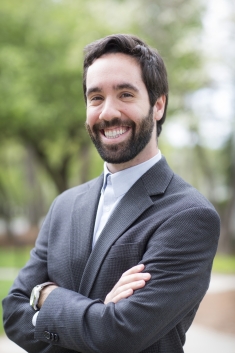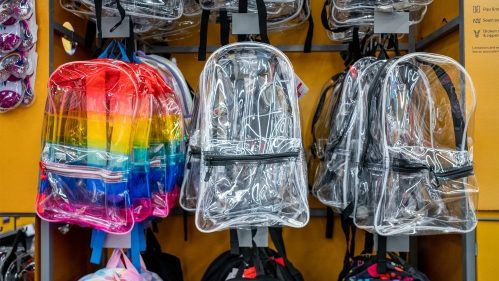Rutgers University–Camden experts say clear-backpack policies do more harm than good
In his iconic hit, Johnny Nash gleefully sang, “I can see clearly now the rain is gone/I can see all obstacles in my way.” However, according to Rutgers University–Camden experts, clear-backpack policies like the one instituted by a Middlesex County school district may do more harm than good in requiring transparency.
In an effort to discourage weapons on school property, South River Public Schools has instituted a clear-backpack policy for the new school year. But according to news reports, many parents claim the new rule is an invasion of privacy. They have a point, said Margaret Betz, the undergraduate program coordinator and an assistant teaching professor of philosophy at Rutgers–Camden.
“Privacy is based on ethical principles about one's basic human dignity and civil rights,” said Betz, an expert in applied ethics. “This means that we all should be granted a realm of protected personal space not subject to others' view, investigation, or interference.”

Betz noted that there are countless examples of how this violation of privacy could affect students. An older student, for instance, may carry sanitary products. Meanwhile, a younger student may get picked on for bringing a favorite stuffed animal or blanket to school for emotional support.
“In the first instance, you fail to protect students’ bodily integrity and privacy, while in the second, you violate their emotional privacy, no differently than if you read their diaries,” Betz said. “These items aren’t anything to be ashamed of, but it is the right of students to keep that information private.”
Moreover, Betz said, this invasion of privacy brings another ethical question into focus: Is the state’s obligation to create an environment that fosters “human flourishing”—developing “well-adjusted, educated, creative citizens”—or simply to keep students safe?
“If the goal of public schools is to foster students’ personal growth, then chipping away at their right to privacy may have a negative impact,” Betz said.
Betz further noted that the policy implies suspicion and lack of trust in students, potentially damaging their relationships with teachers, staff, and administrators and throwing off the balance between transparency and privacy.
“Students have the right to a safe school environment, but challenges arise when that obligation conflicts with their reasonable right to privacy,” Betz said. “It is also unclear whether the policy even achieves the desired result, which could be done by solving America's gun problem directly through legislation."
Dan Semenza, an assistant professor of criminal justice and director of interpersonal violence research at the Rutgers-based New Jersey Gun Violence Research Center, echoed Betz’s sentiment.
“There is no evidence that clear backpacks do anything to improve student safety,” Semenza said. “However, studies show that students hate this policy.”

Semenza noted that schools are scrambling for ways to secure facilities and make students feel safer, and that part of the appeal of clear-backpack policies is that they are less expensive than hiring additional resource officers, enacting regular drills, or installing metal detectors.
“The policy puts the onus on the students and their families to buy the backpacks, unless a district is subsidizing the cost, which is highly unlikely,” Semenza said. “I don't think this is an appropriate or effective way to handle school safety. Limiting access to guns and assault rifles, particularly among young people, makes more sense and can have a bigger effect than clear backpacks.”
Simply put, Rutgers–Camden experts agree: Although clear-backpack policies attempt to provide a better vantage point on school violence, they are ultimately short sighted.



